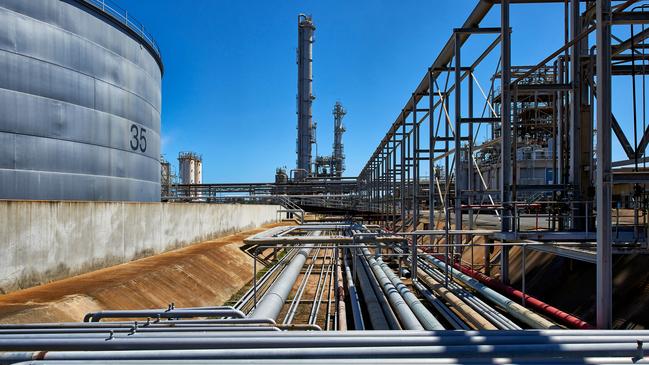Geelong refinery facing closure, warns Viva Energy
Viva Energy has warned its Geelong refinery faces closure, under threat from economic pressures and Victorian lockdowns.

Fuels retailer Viva Energy has lashed the Victorian government for its pathway out of stage four COVID-19 restrictions, saying Premier Daniel Andrews appears to be targeting elimination of the virus which may be unachievable.
The Melbourne-based fuels supplier, which produces half of Victoria’s petrol supplies and operates 1290 Coles Express service stations across Australia, said it was worried about the “roadmap” taken by the state government.
“I‘m pretty disappointed that we’ve got ourselves into this situation and I’m disappointed that the pathway out is pretty long, and I fear potentially unachievable,” Viva chief executive Scott Wyatt told The Australian.
“I‘m concerned that this has evolved into an elimination strategy and that too many businesses won’t survive this.”
Viva said on Monday it may be forced to shut down its Geelong refinery later this year and said the lengthy roadmap out of lockdown may be unrealistic and out of step with states like NSW.
“Achieving the milestone of October 26 where we’ve got five cases per day or less feels a very high bar. I genuinely hope we can achieve that but NSW doesn’t achieve this at this point in time but they still have a fully functioning state and seem to be doing a great job of managing the crisis. So I’m concerned.”
Mr Wyatt said there had been poor communication between the Victorian government and Viva despite its integral role as a major fuels supplier.
“The dialogue with the Victorian government hasn‘t been great. We supply 50 per cent of the state’s energy and liquid fields requirements so we’re an important component of the state’s energy security. We haven’t been engaged at all on the roadmap out of the current restrictions that we’re in. That makes it very difficult for us to contribute to supporting and supplying the state’s fuel requirements through the road map,” Mr Wyatt said.
“We‘re left to basically form our own views based on the announcements we saw yesterday. And we’re having to find crude three months out, so that makes it very difficult to know what the right answer is and how to maintain base production and fuel supply.
“We’ll make sure we continue to supply the state — there’s no doubt about that — but there’s uncertainty and there’s cost associated with that and I think it would be in the state government’s interest to be far more engaged with the sector on a lot of these issues.“
Viva said the longer-term outlook for the refinery remains “very challenging” given the big fall in global demand for oil products and economic jitters from the pandemic.
Earnings for Viva’s refining business plummeted to a $49m first-half loss in August, from a $18.4m profit a year earlier, amid margin pressure after crude premiums increased from the move to low sulphur marine fuels and global demand for oil cratered due to the pandemic.
“Given the materiality of these issues, the company is assessing other options to address operating losses, including the possibility of moving to a full shutdown of the facility,” Viva said in a statement on Monday.
“Unfortunately, the impacts of COVID-19 and the restrictions on mobility and the economy are putting extreme pressures on the refining business that we have not experienced before and are not sustainable over the longer term,” Mr Wyatt said. “We are closely monitoring the evolving situation and will continue to keep our employees, investors and stakeholders updated.”
Viva has been in talks with the Morrison government over possible support for refiners including the creation of a strategic fuel reserve as concern grows over safeguarding a key strand of domestic manufacturing.
Energy Minister Angus Taylor noted Viva’s remarks that the Victorian government’s stage four restrictions were having a significant impact on the viability of its Geelong refinery.
“We hope the Victorian government is working closely with refineries to protect the sector and its workers. The Morrison government is providing ongoing support to Australia’s refineries through the JobKeeper program, and is working closely with the sector on it long-term viability,” Mr Taylor said.
Viva has run scenarios including a full closure of the refinery should broader macro conditions not improve and said it had the balance sheet to handle a shutdown, but could only keep the facility running at a loss for a limited period.
If COVID-19 restrictions are relaxed as foreshadowed and fuel demand recovers, the refinery could return to full production in November.
“The situation, however, is very uncertain and will be monitored closely over the coming weeks to determine whether these extended restrictions will impact these plans,” Viva noted.
Several of Australia’s four remaining refinery operators and fuel suppliers are weighing the future of their plants amid soft margins, high costs and plunging demand due to COVID-19 lockdowns.
Three Australian refineries have shut since 2012 and the remaining plants now produce less than half of the country’s fuel needs, with the bulk of supplies imported from bigger facilities in Singapore, South Korea and Japan.
Rival Ampol plans to closely review the performance of its Lytton oil refinery in Brisbane and is open to government support for the plant after it slumped to a $59m loss in the first half.
The fuels retailer said sales from its Coles alliance network are holding at over 50m litres per week after hitting a low of 40m litres during nationwide lockdowns in April.
Viva shares fell 0.3 per cent on Monday to $1.60.





To join the conversation, please log in. Don't have an account? Register
Join the conversation, you are commenting as Logout